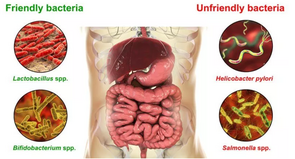Fermentation
THE ART OF FERMENTATION
Video
Hello, I am Lucero Mejia, and what is today’s topic?
Do you know how many cells are in our body? Well, human beings are complex multicellular organisms made up of trillions of cells. Scientists estimate that the adult human body contains around 37 trillion human cells and 200 different cell types. Huge number ahhh and what about the human microbiota (a collection of microorganisms found primarily in the gut?) that consists of a further 10-100 trillion microbial cells. And as I just mentioned, most of the bacteria resides in our GUT, or Intestinal Flora. Therefore, our gut is the home to both good and bad bacteria and the challenge of our body is to maintain the ideal bacterial population balance in our gut so we can optimize our health and/or reverse disease.
Let’s take a look,
Dr. McBride explains: “Once you heal and seal your gut lining, and once you make your digestive system healthy and working properly again, you’ll be surprised how many various symptoms in your body originated from your digestive system. Most [symptoms] start disappearing, because the health and the disease are usually born inside your digestive system. That’s where they originate from.”
One way for maintaining optimal gut health is through fermented or cultured foods. For those of us who make our own probiotics at home, we agree that it is a simple way to live. However, it does require making time to do it. If you don’t enjoy the taste of fermented foods or you are too busy to embark in this process, taking a probiotic supplement can be your next best option.
What Is Fermentation?
According to khanacademy.org, fermentation is the process of using microorganisms, such as bacteria or yeast, to convert carbohydrates to alcohol or organic acids under anaerobic conditions. There are two types of fermentation: alcoholic and lactic acid.
1. Alcoholic fermentation, or ethanol fermentation, is where pyruvate (from glucose metabolism) is broken down into carbon dioxide and ethanol by bacteria and yeast. Alcohol fermentation has been used to produce beer, bread and wine.
2. Pyruvate molecules from glucose glycolysis may be further fermented into lactic acid. Lactic acid fermentation converts lactose into lactic acid.
FERMENTED VEGGIES
 Our fermentation used here is the lactic acid fermentation to ferment food such in the case of kefir, vegetables, sauerkraut, and yogurt just to name a few.
Our fermentation used here is the lactic acid fermentation to ferment food such in the case of kefir, vegetables, sauerkraut, and yogurt just to name a few.
Fermentation and Probiotics do provide similar benefits.In the late 19th century, microbiologist realized microorganisms in the gastrointestinal
tract of healthy individuals were different than those who were sick. These beneficial microflora were named probiotics, literally meaning “for life.” These are microorganisms proven to exert health-promoting influences in humans and animals. The reason why fermented foods and drinks are beneficial is because of the natural probiotics they contain.
According to the Journal of Applied Microbiology, the benefits of consuming probiotics include
(i) improving intestinal tract health;
(ii) enhancing the immune system, synthesizing and enhancing the bioavailability of nutrients;
(iii) reducing symptoms of lactose intolerance, decreasing the prevalence of allergy in susceptible individuals;
(iv)reducing risk of certain cancers.”
Dr. Axe comments that “probiotic bacteria not only balance the good bacteria in the gut, but they also help to “tune up” the immune system. As high as 80% of the immune system lies in the intestine, so nurturing the bowel immunity with probiotic bacteria keeps the intestinal tract healthy”.
DISCOVER 18 AMAZING BENEFITS OF FOOD FERMENTATION

Did you know that fermented foods are rich in probiotic bacteria and by consuming fermented foods we are adding beneficial bacteria to our gut? Scientists are now linking, these tiny creatures to all sorts of health conditions from obesity to neurodegenerative diseases, then let’s take care of our gut, and in turn, the gut will take care of us!
Therefore, let’s deep diving into such an amazing benefits:
 Improves Digestion: Fermentation breaks down nutrients into more easily digestible forms. When lactobacilli in fermented foods proliferate, their vitamin levels increase and digestibility is enhanced.
Improves Digestion: Fermentation breaks down nutrients into more easily digestible forms. When lactobacilli in fermented foods proliferate, their vitamin levels increase and digestibility is enhanced.
Enhances Bioavailability of Nutrients: Fermentation helps create new nutrients and has been shown to improve the availability, digestibility and quantity of some dietary nutrients. As microorganisms go through their life cycles, microbial cultures create B vitamins, including folic acid, riboflavin, niacin, thiamine and biotin. The bioavailability of fat and protein are enhanced by bacterial enzymatic hydrolysis, and the production of lactic acid, butyric acid, free amino acids and short chain fatty acids (SCFA) are increased by lactic acid bacteria.
 Optimizing your immune system: An estimated 80% of your immune system is actually located in your gut. Probiotics play a crucial role in the development and operation of the mucosal immune system in your digestive tract. They also aid in the production of antibodies to pathogens. This makes a healthy gut a major factor in maintaining optimal health, as a robust immunesystem is your top defense system against all disease.
Optimizing your immune system: An estimated 80% of your immune system is actually located in your gut. Probiotics play a crucial role in the development and operation of the mucosal immune system in your digestive tract. They also aid in the production of antibodies to pathogens. This makes a healthy gut a major factor in maintaining optimal health, as a robust immunesystem is your top defense system against all disease.
Reduces Symptoms of Lactose Intolerance: Lactobacillus consumes lactose in milk and transforms it into lactic acid that may be easier for individuals to digest. Lactic acid in kefir and yogurt reduces symptoms of lactose intolerance in individuals who are lactase-deficient. The beneficial effect appears to be a result of the lactic acid bacteria in fermented milk, increasing lactase in the small intestine.
Detoxification: Fermented foods are some of the best chelators available. The beneficial bacteria in these foods are highly potent detoxifiers, capable of drawing out a wide range of toxins and heavy metals.
Cost-effectiveness: Adding a small amount of fermented food to each meal will give you the biggest bang for your buck. Why? Because they can contain 100 times more probiotics than a supplement!
 Natural variety of microflora: As long as you vary the fermented and cultured foods you eat, you’ll get a much wider variety of beneficial bacteria than you could ever get from a supplement.
Natural variety of microflora: As long as you vary the fermented and cultured foods you eat, you’ll get a much wider variety of beneficial bacteria than you could ever get from a supplement.
Behavior: A study published in Neurogastroenterology And; Motility Journal,
found that, mice lacking in gut bacteria behave differently from normal mice engaging in what would be referred to as “high-risk behavior.” This altered behavior was accompanied by neurochemical changes in the mouse brain. In fact, your gut serves as your second brain. It produces more serotonin, which is known to have a positive influence on your mood, than your brain does.
 Diabetes: According to a study from Denmark, bacterial population in the gut of diabetics differs from non-diabetics. The results of the study indicate that type 2 diabetes in humans is linked to compositional changes in intestinal microbiota.A healthy diet – low in sugar and grains, and high in whole raw foods and fermented foods – allows your beneficial gut bacteria to flourish.
Diabetes: According to a study from Denmark, bacterial population in the gut of diabetics differs from non-diabetics. The results of the study indicate that type 2 diabetes in humans is linked to compositional changes in intestinal microbiota.A healthy diet – low in sugar and grains, and high in whole raw foods and fermented foods – allows your beneficial gut bacteria to flourish.
Autism: Establishment of normal gut flora in the first 20 days or so of life, is critical in appropriate maturation of your baby’s immune system. Babies with abnormal gut flora have compromised immune systems and are particularly at risk for developing ADHD, learning disabilities, and autism, especially if they are vaccinated before restoring balance to their gut flora.
 Obesity: Restoring your gut flora is a crucial consideration if you’re struggling to lose weight.Fermented foods have the unique ability to ease digestive discomfort related to having either too much or too little stomach acid. When the production of hydrochloric acid by the stomach is low, fermented foods help increase the acidity of gastric juices. On the other hand, when the stomach produces too much acid, fermented foods help protect the stomach and intestinal lining. As we age, our production of the digestive enzymes and juices requiredfor proper digestion begin to decrease. Drinking and eating traditional fermented foods like kefir, sauerkraut, and pickled vegetables can help make up for this loss. The key is to eat a small portion once or twice daily with meals.
Obesity: Restoring your gut flora is a crucial consideration if you’re struggling to lose weight.Fermented foods have the unique ability to ease digestive discomfort related to having either too much or too little stomach acid. When the production of hydrochloric acid by the stomach is low, fermented foods help increase the acidity of gastric juices. On the other hand, when the stomach produces too much acid, fermented foods help protect the stomach and intestinal lining. As we age, our production of the digestive enzymes and juices requiredfor proper digestion begin to decrease. Drinking and eating traditional fermented foods like kefir, sauerkraut, and pickled vegetables can help make up for this loss. The key is to eat a small portion once or twice daily with meals.
Enables the body to produce acetylcholine: Acetylcholine is a neurotransmitter that facilitates the transmission of nerve impulses. Within the context of digestion, it helps increase the movement of the bowel, and can help reduce constipation. It also helps improve the release of digestive juices and enzymes from the stomach, pancreas, and gallbladder. So by helping your body produce acetylcholine, fermented foods act as potent digestive aids. In addition to improving pancreatic function, which is of great benefit to diabetics, the carbohydrates in lactic acid–fermented foods have been broken down or “pre-digested”, so they do not place an extra burden on the pancreas, unlike ordinary carbohydrates.
Produces compounds that destroy and inhibit the growth of pathogenic bacteria: Many pathogenic forms of bacteria are sensitive to acidic environments. This is true of both cholera and typhoid. In the early 1950s, during an epidemic of typhoid fever in Europe, reports emerged showing that fresh sauerkraut was an effective agent for killing the bacteria. More recently, German scientists were working with a strain of lactic acid bacteria found in sourdough bread, and discovered that it seemed to be more effective than other strains at killing microbes. In early lab results, it quickly eliminated the super-bugs currently resistant to most antibiotics.
Many pathogenic forms of bacteria are sensitive to acidic environments. This is true of both cholera and typhoid. In the early 1950s, during an epidemic of typhoid fever in Europe, reports emerged showing that fresh sauerkraut was an effective agent for killing the bacteria. More recently, German scientists were working with a strain of lactic acid bacteria found in sourdough bread, and discovered that it seemed to be more effective than other strains at killing microbes. In early lab results, it quickly eliminated the super-bugs currently resistant to most antibiotics.
Suppresses H. pylori:Helicobacter pylori infection is an important risk factor for many gastrointestinal diseases. Some fermented foods serve useful for suppressing H. pylori infection. An observational study published in World Journal of Gastroenterology Involving 464 participants found lower prevalence of H. pylori seropositivity in those who consumed yogurt more than once a week compared to those who did not. This confirms other research findings that fermented milk improves gastrointestinal symptoms in patients who tested positive for H. pylori.
Has Anticancer Effects: Cancer is caused by activation or mutation of abnormal genes, which control cell growth and division. Researchers believe probiotic cultures and fermented foods might decrease the exposure to chemical carcinogens by:detoxifying the ingestion of carcinogens, altering the environment of the intestine and decreasing metabolic activities or populations of bacteria that may generate carcinogenic compounds. Fermented food produce metabolic products that cause programmed cell death, or apoptosis, as well as produce compounds that inhibit the growth of tumor cells, and stimulate the immune system to defend itself against cancer cell proliferation.There are several reports on the ways fermented foods can help treat cancer.
Helps Treat Hepatic Disease: Non-alcoholic fatty liver diseases is the buildup of extra fat in the liver cells not caused by alcohol. Liver disease can cause liver swelling, scarring, and even lead to cancer or liver failure.
In a double-blind, randomized, controlled clinical trial, some participants consumed 300 grams a day of fermented probiotic yogurt containing lactobacillus acidophilus and bifidobacteriumlactis, while those in the control group consumed 300 grams a day of conventional yogurt for eight weeks. The group who consumed the probiotic yogurt had reductions in alanine aminotransferase, aspartate aminotransferase, total cholesterol and low-density lipoprotein cholesterol compared to the control group. The reduction in these parameters may be useful in management of liver disease risk factors.
 Improves Arthritis Symptoms: Most people know someone with arthritis. It is the leading cause of disability, with symptoms including aching, pain, stiffness and swelling of the joints. It is thought that inflammation associated with rheumatoid arthritis symptoms may be modulated by the consumption of fermented foods.A randomized, double-blind, placebo-controlled pilot study of probiotics in active rheumatoid arthritis found that, “patients with at least four swollen and four tender joints and stable medications with no steroids for at least one month prior to and during the study, showed a significant improvement in the Health Assessment Questionnaire score after three months of probiotic treatment.”
Improves Arthritis Symptoms: Most people know someone with arthritis. It is the leading cause of disability, with symptoms including aching, pain, stiffness and swelling of the joints. It is thought that inflammation associated with rheumatoid arthritis symptoms may be modulated by the consumption of fermented foods.A randomized, double-blind, placebo-controlled pilot study of probiotics in active rheumatoid arthritis found that, “patients with at least four swollen and four tender joints and stable medications with no steroids for at least one month prior to and during the study, showed a significant improvement in the Health Assessment Questionnaire score after three months of probiotic treatment.”
Treats Inflammatory Bowel Disease: Fermented milk supplemented with probiotics can exhibit a direct effect in the gut in managing inflammatory and functional bowel disorders. Clinical trials show that probiotics help reduce abdominal pain, bloating, constipation and flatulence in patients with inflammatory bowel disease, including Crohn’s disease.
Therefore, fermented foods are chock-full of probiotics or good bacteria. A myriad of research has demonstrated how the ideal balance of good and bad bacteria in your gut forms the foundation for physical, mental, and emotional well-being.
Beware of some “probiotic” yogurts. Most of them that you find in the grocery are NOT recommended for many reasons: they are pasteurized and typically contain added sugars, high-fructose corn syrup, dyes, and/or artificial sweeteners, which can be detrimental to your health.
How About a High-Quality Probiotic Supplement?
 If you do not enjoy the taste of fermented foods, taking a probiotic supplement can be your next best option.
If you do not enjoy the taste of fermented foods, taking a probiotic supplement can be your next best option.
But don’t give up on fermented foods too easily: start with small amounts like a half-teaspoon, and use them as a condiment added to your food, like a salad dressing.
Personally, before I made my own probiotics I used to take 2 probiotic capsules equivalent to 20 billion colonies of acid-resistant flora from seven diverse strains. But, now that I am a fun of making my own fermented vegetables and/or probiotics, I only consume 1 capsule equivalent to 10 billion colonies, of the same source.
Your probiotic supplement should fulfill the following quality and efficacy criteria:
- Build and maintain a healthy digestive system while supporting immunity.
- Boost the absorption of nutrients consumed in food and nutritional supplements.
- Replenish the natural balance of good flora in your digestive tract.
- Protects against occasional digestive upsets.
- The bacteria strains in the product must be able to survive your stomach acid and bile, so that they reach your intestines alive in adequate numbers
- The bacteria strains must have health-promoting features
- The probiotic activity must be guaranteed throughout the entire production process, storage period and shelf life of the product.
If you have questions and do not know how to start to change or improve your lifestyle, just contact us and we will be happy to assist you.
REFERENCES:
https://www.drdavidwilliams.com/gut-bacteria-and-probiotics-article-index
https://articles.mercola.com/fermented-foods.aspx
http://onlinelibrary.wiley.com/doi/10.1111/j.1365-2672.2006.02963.x/full
http://ajcn.nutrition.org/content/73/2/430s.full
https://www.ncbi.nlm.nih.gov/pmc/articles/PMC3812493/
https://draxe.com/what-is-fermentation/
https://www.ncbi.nlm.nih.gov/pmc/articles/PMC4303846/
https://www.ncbi.nlm.nih.gov/pmc/articles/PMC3419998/
https//biologydictionary.net/how-many-cells-are-in-the-human-body/


